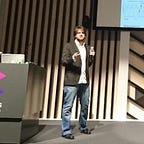Workshop dai4sdg’17: Data and AI towards the SDGs and data-driven public policies.
Data sharing mechanisms and data literacy are necessary to make data for social good a reality
Sustainable Development Goals set the priorities and scope of the global sustainability agenda. They imply a global commitment that calls for action and strategic plans. From UN Secretary General it has been acknowledged the advance towards the SDGs, but also the need to speed up the pace so they can be achieved by 2030.
The event #dai4sdg’17 organized by the LifeD Lab aimed at checking on the state of data for social good and the SDGs to create and share actionable knowledge. Experts from public and private sectors and academy discussed about the challenges, opportunities and projects at the national and international levels. The event gathered the Technical University Madrid, IDDRI-Sciences Po, BBVA Data&Analytics, Vodafone, Fundación Seres, Data-pop Alliance and the UCIII University.
Teresa Ribera, director of IDDRI pointed “no existe todavía, y es necesaria, una reflexión sistemática sobre los SDGs”. Ribera explained the current work of some countries about the impact of SDGs at the national and international levels and how internal policies could affect at a larger scale. For this reason, deep considerations are necessary in common spaces for transnational impact. Warning mechanisms and long term systemic solutions must be combined and big data turns to be one new important ally.
SDGs categorise sustainability work calling for establishing priorities and organization systems. SDGs give rise to new questions, tensions, opportunities and new challenges to develop capacities and collaborative programs so technologies help to help the most needed and vulnerable.
Nuria Oliver detailed the challenges to turn data for social good into reality: internal barriers, technological challenges, capacity building, new social questions, privacy, security, ethics, work dynamics and financial cost. Projects for social good must define the details of data access and application before starting to data can be used in a responsible way. Projects must be legal, socially acceptable, commercially and financially viable, technically feasible and sustainable. The internal organization of multinational companies are challenging this situation to include data for good as part of their core business.
Mobile phone data has been the most relevant big data sources enabling projects for social good and development. International initiatives have created opportunities to study this data through international challenges, multi-stake collaborations and technological platforms such as OPAL or Magic Box. These initiatives have been organized by telcos, United Nations or academic institutions.
The director of Data-Pop Alliance, Emmanuel Letouzé participated in the event reminding the motivations of the Data Revolution. Letouzé explained that data can help SDGs in two different ways: measuring and promoting changes and actions. Data help to empower social groups, so not only technology matters but social and political aspects are totally relevant. Data literacy is key for achieving the SDGs.
Privacy is another of the important keys to carry out this revolutions. Systemic solutions and warning systems require data ecosystems that enable the access to data in the right timing and with the necessary resolution to match the requirements of the systems and solutions.
Juan Murillo from BBVA Data&Analytics showed how transactions data can be used to understand territorial segmentations and improve humanitarian action in real-time. Their collaboration with United Nations Global Pulse is a cornerstone example to understand resilience during the hurricane Odile in México analyzing the behaviour of the population and the distribution of the expenditure along the disaster phases. Given data sharing mechanisms, big data can help in the early humanitarian response to different types of threats and also mid and long term solutions such as improving urban design, health systems and the social systems. David Martín from UCIII showed how behaviors in social networks can help to create mechanisms to improve health.
Changes are happening in Spain, not only the leaders of the data sector seen an opportunity, but also companies from other sectors are looking at data, AI and SDGs. Seres Foundation participated in the event showing the current state in Spain. Big opportunities to change the labour market and new collaboration frameworks between different sectors are opening thanks to AI and the SDGs. We can expect in the nearby future companies from different sectors developing projects for social good and also new models of collaboration between private and public sector promoting research and business for sustainability.
In the public sector, the recent creation of the committee for Artificial Intelligence is a proof of the growing interest in generating a digital agenda aligned with the international efforts. The recent adoption of the GDPR will pose more challenges that will be faced with data literacy and technological development under a humanistic and human-rights based approach. With no doubt, we are in a key moment for public and private sector to depict the future towards the Sustainable Development Goals and the role of the digital revolution.
[3] undatarevolution.org
[4] http://www.fundacionseres.org/Paginas/Campus/BuenasPracticas.aspx?IDe=161
